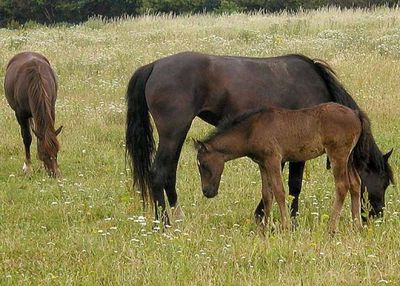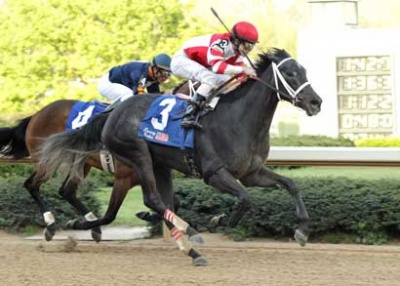URIs (Upper Respiratory Infections) are common in horses. But it’s important to treat them because complications can arise with serious results.
Symptoms are the same as for humans – runny nose, clear to yellowish discharge, runny or inflamed eyes, a dry or moist cough, fever, lethargy.
A horse normally takes 6-8 breaths per minute. Watch for any changes in breathing patterns that could indicate a problem.
Viral Infections – With horse flu, the animal can be ill for 2-4 weeks or more.. The herpes virus or rhinopneumonitis virus remains in the horse’s body for life. It can cause abortions or neurological problems. Although the immune system generally keeps the virus in remission, a flare-up is possible. Other viruses such as corona, adenovirus, parainfluenza are not often seen in horses. Viral infections can affect the heart and horses must be rested for long periods to try to avoid this problem.
Fungal infections are not common but do occur. Horses with chronic lung allergies or those being given antibiotics are more prone to fungal infections.
Parasites such as the larvae of roundworms are sometimes found in the lungs of young horses and can cause viral or bacterial infections. Horses 1-4 years old usually build up an immunity. Threadworms can also affect young horses. There may be a problem with older horses who have weak or compromised immune systems. Lungworms, while more of a problem for donkeys, can affect horses too. Strangles, a bacterial infection, can spread to internal organs causing abscesses. The legs sometimes swell breaking open the skin and oozing material. Kidney damage and laminitis can occur as well.
The first thing to do with any infection is to isolate the ailing horse to avoid spreading the infection to other horses. Contact your veterinarian to come and check the horse. With other horses, consult your veterinarian about the incubation period for the specific infection. Ask if any of the horses that have had any contact with the ill horse should be isolated as well. Daily temperature taking during the incubation period can alert you to illness.
The infected horse should have plenty of rest. Watch for any change in breathing and keep the horse hydrated. Keep your vet apprised of the situation. Your veterinarian will recommend treatment and prescribe any medications if necessary.
Laryngeal Hemiplegia is when the cartilage on either side of the top of the trachea becomes paraliyzed. This causes a noise known as roaring. Some of the causes can be unknown, a result of placement of an injection, neck trauma, infection. Treatment recommended is usually a laryngoplasty, surgery involving either removal of the cartilage or suturing it (tieback).
Exercise-induced Pulmonary Hemorrhage is thought to be caused by the rupture of small blood vessels (alveolar capillaries) in the lungs. This can occur when a horse is heavily exercised. If you notice some blood in your horse’s nostrils after intense exercise, this could be the reason. Your vet will diagnose the problem using endoscopy and prescribe treatment.
With any infections the system is weakened leaving the horse open to other diseases. Regular veterinary checkups will help avoid serious illness. If there are any changes in eating habits, breathing, exercise, behavior, etc., your horse should be seen by the veterinarian.


